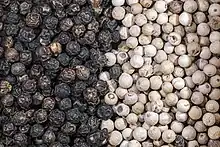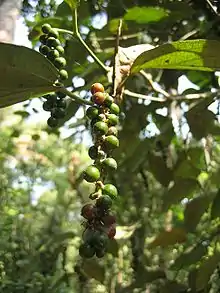piper
English

Etymology 1
From Middle English piper, pipere; equivalent to pipe + -er. Piecewise doublet of fifer.
Pronunciation
- (UK) IPA(key): /ˈpaɪ.pə/
Audio (UK) (file) - (US) IPA(key): /ˈpaɪ.pɚ/
- (Canada) IPA(key): /ˈpʌɪ.pɚ/
- Rhymes: -aɪpə(ɹ)
Noun
piper (plural pipers)
- A musician who plays a pipe.
- A bagpiper.
- 2020 May 20, “Railway remembers VE Day with a series of tributes”, in Rail, page 15:
- At Glasgow Central and Edinburgh Waverley, the sounding of train horns was followed by a lone piper playing When the Battle's Over.
-
- A baby pigeon.
- A common European gurnard (Trigla lyra), having a large head, with prominent nasal projection, and with large, sharp, opercular spines.
- A sea urchin (Cidaris cidaris) with very long spines, native to the American and European coasts.
- (slang, obsolete) A broken-winded hack horse.
Synonyms
- (bagpiper): bagpiper
- (baby pigeon): squab, baby pigeon, pigeon chick
Derived terms
- drunk as a piper
- pay the piper
- Pied Piper
- who pays the piper calls the tune
Related terms
- bagpiper
- hornpiper
Translations
|
Etymology 2
Noun
piper
- Archaic form of pepper.
Anagrams
- PIREP
Aromanian
Alternative forms
- piperu, chiper
Etymology
From Greek πιπέρι (pipéri), from Ancient Greek πέπερι (péperi).
Noun
piper m
- pepper (plant)
- pepper (spice)
Derived terms
- mpipiredz
See also
- pipercã
- sari
French
Pronunciation
Audio (file)
Verb
piper
- This term needs a translation to English. Please help out and add a translation, then remove the text
{{rfdef}}.
Conjugation
| infinitive | simple | piper | |||||
|---|---|---|---|---|---|---|---|
| compound | avoir + past participle | ||||||
| present participle or gerund1 | simple | pipant /pi.pɑ̃/ | |||||
| compound | ayant + past participle | ||||||
| past participle | pipé /pi.pe/ | ||||||
| singular | plural | ||||||
| first | second | third | first | second | third | ||
| indicative | je (j’) | tu | il, elle, on | nous | vous | ils, elles | |
| (simple tenses) | present | pipe /pip/ | pipes /pip/ | pipe /pip/ | pipons /pi.pɔ̃/ | pipez /pi.pe/ | pipent /pip/ |
| imperfect | pipais /pi.pɛ/ | pipais /pi.pɛ/ | pipait /pi.pɛ/ | pipions /pi.pjɔ̃/ | pipiez /pi.pje/ | pipaient /pi.pɛ/ | |
| past historic2 | pipai /pi.pe/ | pipas /pi.pa/ | pipa /pi.pa/ | pipâmes /pi.pam/ | pipâtes /pi.pat/ | pipèrent /pi.pɛʁ/ | |
| future | piperai /pi.pʁe/ | piperas /pi.pʁa/ | pipera /pi.pʁa/ | piperons /pi.pʁɔ̃/ | piperez /pi.pʁe/ | piperont /pi.pʁɔ̃/ | |
| conditional | piperais /pi.pʁɛ/ | piperais /pi.pʁɛ/ | piperait /pi.pʁɛ/ | piperions /pi.pə.ʁjɔ̃/ | piperiez /pi.pə.ʁje/ | piperaient /pi.pʁɛ/ | |
| (compound tenses) | present perfect | present indicative of avoir + past participle | |||||
| pluperfect | imperfect indicative of avoir + past participle | ||||||
| past anterior2 | past historic of avoir + past participle | ||||||
| future perfect | future of avoir + past participle | ||||||
| conditional perfect | conditional of avoir + past participle | ||||||
| subjunctive | que je (j’) | que tu | qu’il, qu’elle | que nous | que vous | qu’ils, qu’elles | |
| (simple tenses) | present | pipe /pip/ | pipes /pip/ | pipe /pip/ | pipions /pi.pjɔ̃/ | pipiez /pi.pje/ | pipent /pip/ |
| imperfect2 | pipasse /pi.pas/ | pipasses /pi.pas/ | pipât /pi.pa/ | pipassions /pi.pa.sjɔ̃/ | pipassiez /pi.pa.sje/ | pipassent /pi.pas/ | |
| (compound tenses) | past | present subjunctive of avoir + past participle | |||||
| pluperfect2 | imperfect subjunctive of avoir + past participle | ||||||
| imperative | – | – | – | ||||
| simple | — | pipe /pip/ | — | pipons /pi.pɔ̃/ | pipez /pi.pe/ | — | |
| compound | — | simple imperative of avoir + past participle | — | simple imperative of avoir + past participle | simple imperative of avoir + past participle | — | |
| 1 The French gerund is usable only with the preposition en. | |||||||
2 In less formal writing or speech, these tenses may be found to have been replaced in the following way:
(Christopher Kendris [1995], Master the Basics: French, pp. 77, 78, 79, 81). | |||||||
Derived terms
- ne pas piper mot
- sans piper mot
Latin

Alternative forms
- *piber
Etymology
Borrowed from Ancient Greek πέπερι (péperi, “pepper”), via Middle Persian from an Indo-Aryan source, ultimately from Sanskrit पिप्पलि (pippali, “long pepper”), itself of unknown origin (perhaps a Dravidian or other substrate language of the Indian subcontinent). The declension was changed to a rhotic-stem.
Pronunciation
- (Classical) IPA(key): /ˈpi.per/, [ˈpɪpɛr]
- (Ecclesiastical) IPA(key): /ˈpi.per/, [ˈpiːper]
Noun
piper n (genitive piperis); third declension
- pepper
- compiled by 5th century CE, Apicius, De Re Coquinaria 4.12:
- ...Et, cum siccaverint, super aspargis piper tritum et inferes. Ad mensam nemo agnoscet quid manducet.
- ...And, when they get dry, sprinkle mashed pepper on them, and serve. At the table, no one will know what they're eating.
- ...Et, cum siccaverint, super aspargis piper tritum et inferes. Ad mensam nemo agnoscet quid manducet.
Declension
Third-declension noun (neuter, imparisyllabic non-i-stem).
| Case | Singular | Plural |
|---|---|---|
| Nominative | piper | pipera |
| Genitive | piperis | piperum |
| Dative | piperī | piperibus |
| Accusative | piper | pipera |
| Ablative | pipere | piperibus |
| Vocative | piper | pipera |
Derived terms
- piperātārius
- piperātōrium
- piperātum
- piperātus
- piperita
Related terms
- piperītis
Descendants
- Dalmatian:
- pepro
- Italo-Romance:
- Italian: pepe
- Sicilian: pipi
- Calabrian: pipi, pipe
- Padanian:
- Emilian: péivar, pévar, peuvre
- Friulian: pevar
- Ladin: peiver
- Ligurian: pèivie, pèivre, pèive, pêve
- Lombard: pever, pévar, péer, pìer, per, péivar
- Alpine: péuro
- Ossolano: péuro, pòvar
- Piedmontese: péiver, paivre, péure, paire, pèvre, pèive, pèivre, pòiver
- Romagnol: pévre, pévar, péivar, puéivar
- Romansch: paiver, peiver, pever
- Venetian: pévaro, pévar, pévare
- Borrowings:
- → Italian: pevere
- → Mòcheno: pever
- Northern Gallo-Romance:
- Franco-Provençal: pêvro, pèivro
- Old French: poivre, peivre, peivere
- French: poivre
- Norman: paîvre, pêvre (Jersey) (Guernsey), pevr (Sark)
- Walloon: poevrî
- Southern Gallo-Romance:
- Aragonese: pebre
- Catalan: pebre
- → Galician: prebe (“sauce, pepper”)
- → Spanish: pebre
- Occitan: pebre
- Gascon: péber, púber
- Vivaro-Alpine: peure
- Valadas: pióre, piòure
- Insular Romance
- Sardinian: pibere, pibiri, pipere
- ⇒With suffix -ōnem, meaning bell pepper:
- Italo-Romance:
- Italian: peperone
- Padanian:
- Emilian: puvron, pevron, pivron
- Ligurian: pevión, povrón, peverón, peveión
- Lombard: peveron, pieron, povron
- Piedmontese: povron, puvron, pevron, pouron
- → Vivaro-Alpine: povron, puvron (Valadas)
- Romagnol: pevaron, piviron, povaron
- Northern Gallo-Romance:
- Franco-Provençal: pêvron, povrun, peivron, póuron
- French: poivron
- Southern Gallo-Romance:
- Occitan: pebron (also pebròt, peberòt, cf. Catalan pebrot)
- Italo-Romance:
- Borrowings
- → Basque: piperra
- → Middle Irish: pipur
- Irish: piobar
- Manx: pibbyr
- Scottish Gaelic: peabar, piobar
- → Old Norse: piparr, pipari
- Icelandic: pipar
- Faroese: pipar
- Norwegian: pepar
- Swedish: peppar
- → Finnish: pippuri
- → Northern Sami: bihppor
- → Finnish: pippuri
- Old Danish: pipær
- Danish: peber
- Elfdalian: pipär
- → Estonian: pipar
- → Latvian: pipars
- → Proto-Slavic: *pьpьrь (see there for further descendants)
- → Translingual: Piper
- → Welsh: pupur
- → Proto-West Germanic: *piper (see there for further descendants)
- Old English: pipor, piper
- Middle English: peper
- English: pepper (see there for further descendants)
- Scots: peper, pepar, pepir
- Yola: pipper
- Middle English: peper
- Old English: pipor, piper
References
- “piper”, in Charlton T. Lewis and Charles Short (1879) A Latin Dictionary, Oxford: Clarendon Press
- “piper”, in Charlton T. Lewis (1891) An Elementary Latin Dictionary, New York: Harper & Brothers
- piper in Gaffiot, Félix (1934) Dictionnaire illustré latin-français, Hachette
- “piper”, in Harry Thurston Peck, editor (1898) Harper's Dictionary of Classical Antiquities, New York: Harper & Brothers
- “piper”, in William Smith et al., editor (1890) A Dictionary of Greek and Roman Antiquities, London: William Wayte. G. E. Marindin
Middle English
Etymology 1
From Old English pīpere; equivalent to pipe + -er; compare Old Norse pípari and Old High German pfīfari.
Alternative forms
- pipare, pipere, pyper, pypere, pypare
Pronunciation
- IPA(key): /ˈpiːpər(ə)/
Noun
piper (plural pipers)
- A piper; one who plays a pipe.
Descendants
- English: piper
- Scots: piper
- Yola: peepeare, pipere
References
- “peper, n.”, in MED Online, Ann Arbor, Mich.: University of Michigan, 2007, retrieved 2022-01-04.
Noun
piper
- Alternative form of peper
Norman
Verb
piper
- (Jersey, onomatopoeia) to peep
Norwegian Bokmål
Noun
piper m or f
- indefinite plural of pipe
Norwegian Nynorsk
Noun
piper f
- indefinite plural of pipe
Old English
Pronunciation
- IPA(key): /ˈpi.per/
Noun
piper m
- Alternative form of pipor
Romanian

Etymology
From Bulgarian пипе́р (pipér), from Proto-Slavic *pьpьrь, from Latin piper, from Ancient Greek πέπερι (péperi), from Sanskrit पिप्पलि (pippali).
Noun
piper m (plural piperi)
- pepper (plant)
- pepper (spice)
Declension
| singular | plural | |||
|---|---|---|---|---|
| indefinite articulation | definite articulation | indefinite articulation | definite articulation | |
| nominative/accusative | (un) piper | piperul | (niște) piperi | piperii |
| genitive/dative | (unui) piper | piperului | (unor) piperi | piperilor |
| vocative | piperule | piperilor | ||
See also
- sare
Swedish
Pronunciation
- IPA(key): /ˈpiːpɛr/
Verb
piper
- present tense of pipa.
West Frisian
Etymology
From Old Frisian piper, from Proto-West Germanic *piper, from Latin piper.
Noun
piper c (plural pipers, diminutive piperke)
- pepper (spice)
Further reading
- “piper”, in Wurdboek fan de Fryske taal (in Dutch), 2011